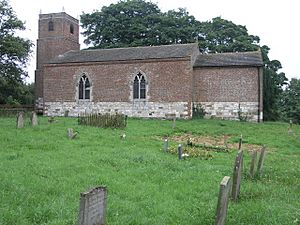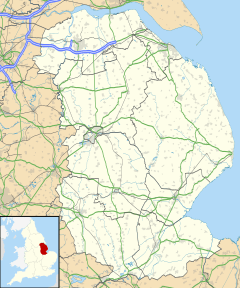Welton le Marsh facts for kids
Quick facts for kids Welton le Marsh |
|
|---|---|
 St Martin's Church, Welton le Marsh |
|
| Population | 212 (2011) |
| OS grid reference | TF472686 |
| • London | 115 mi (185 km) S |
| Civil parish |
|
| District | |
| Shire county | |
| Region | |
| Country | England |
| Sovereign state | United Kingdom |
| Post town | Spilsby |
| Postcode district | PE23 |
| Police | Lincolnshire |
| Fire | Lincolnshire |
| Ambulance | East Midlands |
| EU Parliament | East Midlands |
| UK Parliament |
|
Welton le Marsh, also known as Welton in the Marsh, is a small village in Lincolnshire, England. It's part of the East Lindsey area. You can find it about 6 kilometers (4 miles) northeast of Spilsby and 5 kilometers (3 miles) south of Alford. A tiny nearby settlement called Boothby is also part of Welton le Marsh.
Contents
Discovering Welton le Marsh
What's in a Name?
The name "Welton le Marsh" comes from old English words. "Wella-tun" meant a "farm" or "settlement" that had a "spring" or "stream." The word "Marsh" was added later. This helped people tell it apart from other villages in Lincolnshire that were also called Welton.
A Look Back in Time
Welton le Marsh has a long history! People have lived here for thousands of years.
Ancient Discoveries
In 1948, a Neolithic (New Stone Age) flint axe was found here. This tool was used by people living around 4,500 to 2,500 BC. An old stone hammer head was also found in 1906. Later, a Bronze Age axe was discovered near Hanby Hall Farm. These finds show that ancient communities lived and worked in this area.
Medieval Castle Remains
About 275 meters (300 yards) east of Hanby Hall Farm, you can find the remains of an old motte. A motte is a large mound of earth where a wooden castle tower would have stood. This motte is about 5.5 meters (18 feet) high and has a ditch around it. It's a cool reminder of medieval times!
Important Buildings
St. Martin's Church
The village church is named after Saint Martin. It was first built a very long time ago, in the Middle Ages. It was rebuilt in 1792 using stone and brick, and then fixed up again in 1891. It's considered a Grade II* listed building, which means it's a very important historic building.
Thwaite Hall
Thwaite Hall is another historic building, listed as Grade II. People believe it was once part of an Augustinian Priory, which is a type of monastery. The house you see today dates back to the 14th century. Records from 1440 show it was a small Augustinian religious house connected to Thornton Abbey.
The Wheel Inn
If you're looking for a place to eat or relax, Welton le Marsh has a local public house called The Wheel Inn.
Nature and Wildlife
Candlesby Hill Quarry
Within the parish of Welton le Marsh, you'll find Candlesby Hill Quarry. This area used to be a chalk pit for the Gunby estate. Today, it's a special nature reserve! It's a Site of Special Scientific Interest (SSSI), which means it's protected because of its important wildlife and geology. The Lincolnshire Wildlife Trust helps to look after it.
 | Jessica Watkins |
 | Robert Henry Lawrence Jr. |
 | Mae Jemison |
 | Sian Proctor |
 | Guion Bluford |


